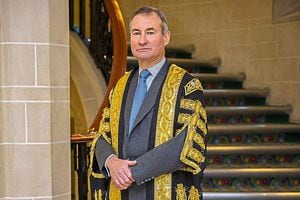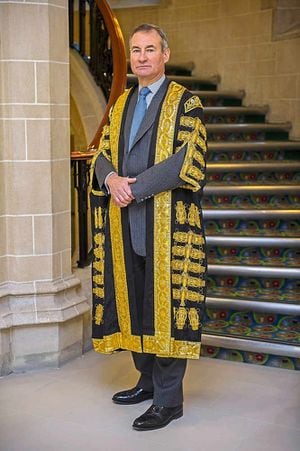Brexit court case: Appeal judge in Government's EU referendum battle went to Wolverhampton's Tettenhall College
One of a group of 11 senior judges presiding over the Government's Brexit appeal was educated in Wolverhampton, it has been revealed.

Lord Anthony Hughes went to school at Tettenhall College before embarking on a career in the legal profession that now sees him overseeing one of the biggest constitutional court cases in living memory.
This week he and the other 10 justices of the Supreme Court sat together for the first time to rule over whether the Government will need parliamentary approval before triggering Britain's departure from the EU.

Theresa May brought the appeal following a High Court decision last month. Lord Hughes, of Ombersley, in Worcestershire, attended the Wood Road school in the 1960s.
The 68-year-old gained a law degree at Durham University and became a barrister in 1970. He was a Crown Court recorder for 12 years, during which time he was Head of Chambers at Birmingham law firm No.1 Fountain Court Chambers.
He served as a judge in the High Court's Family Division between 1997 and 2003 and was Presiding Judge on the Midlands Circuit between 2000 and 2004.
In 2004, he was assigned to the Queen's Bench Division and was promoted to the Court of Appeal soon after.
The father of two attracted controversy in 2009 when he reduced the sentence of Jason Owen, one of the three people convicted over the death of Baby P.
He became a member of the Supreme Court in 2013.
This week's four-day case came after High Court judges ruled that the Government does not have the constitutional right to start the Brexit process without the backing of lawmakers.
The case featured evidence from a Polish mother of one who lives in Wolverhampton, who said she represented the position of several thousand EEA nationals.
Solicitors from Birmingham-based law firm 43templerow Chambers, who represent the woman, argued that her family's residence rights could be threatened once Article 50 is invoked.
Over four days of complex legal arguments the Government set out the grounds for its appeal.
But Lord Pannick QC, who represents claimant Gina Miller, told the court Theresa May does not have sufficient authority to trigger Article 50 and said there should be a full Act of Parliament.
However, Supreme Court President Lord Neuberger argued that 'the average person in the street' would not see the difference.
The Supreme Court is expected to deliver its ruling ruling in January.





